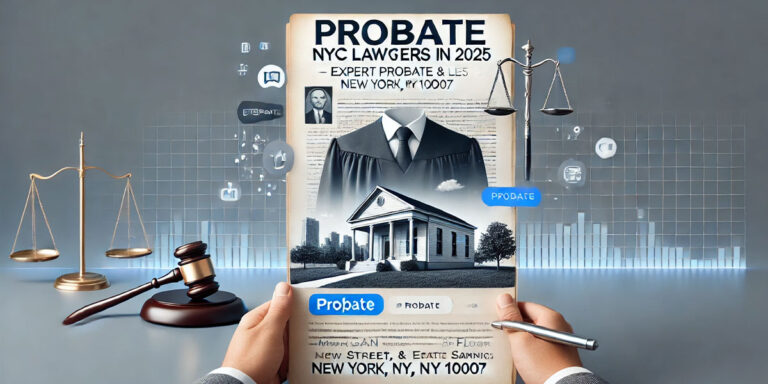
Probate NYC Lawyers
Probate Lawyers in NYC: Navigating Estate Administration in 2025 The loss of a loved one is a difficult experience, often compounded by the complexities of


Home » Will

Probate Lawyers in NYC: Navigating Estate Administration in 2025 The loss of a loved one is a difficult experience, often compounded by the complexities of

The Role of an Elder Law Attorney in New York: Protecting Seniors and Their Futures As individuals age, they often face unique legal and financial

Mastering Wills and Trusts: Crafting Your Ideal New York Estate Plan Creating a comprehensive estate plan is critical in protecting your assets, providing for your

7 Essential Things You Need to Know About Estate Planning in New York Estate planning can seem overwhelming, but it’s one of the most important

Navigating Wills and Trusts: Why You Need Experienced Lawyers in New York Creating a comprehensive estate plan is crucial in protecting your assets, providing for

Honoring the Legacy of Hard Work and Protecting Your Family’s Future: The Morgan Legal Group Story At Morgan Legal Group, we understand that estate planning

From Refugee to Legal Pioneer: Russel Morgan’s Journey of Resilience and Success – A Comprehensive FAQ At Morgan Legal Group P.C., we are so proud

Navigating Probate Litigation in New York: Expert Guidance from Morgan Legal Group Dealing with the loss of a loved one is challenging enough without the

Expert Estate Litigation in New York with Morgan Legal Group: Protecting Your Inheritance and Ensuring Justice is Served Estate litigation involves numerous challenges, particularly when

New York Guardianship Proceedings: Protecting Incapacitated Individuals with Expert Legal Guidance from Morgan Legal Group Guardianship proceedings are crucial in protecting the rights and assets

Will Contest Lawyer in New York: Challenging Invalid Wills and Protecting Your Inheritance Challenging the validity of a will can be a complex and emotional

All About Wills and Trusts: Understanding Your Options for Estate Planning in New York Welcome to Morgan Legal Group P.C., your trusted partner for expert

Seeking an Estate Planning and Probate Attorney in Brooklyn, New York: Expert Guidance for Securing Your Family’s Future Welcome to Morgan Legal Group P.C., your

NYC Power of Attorney: A Complete Guide to Protecting Your Future In the bustling city of New York, planning for the unexpected is crucial. A

Expert Estate Litigation in New York with Morgan Legal Group: Protecting Your Inheritance and Resolving Family Disputes Estate litigation involves numerous challenges, particularly when you’re

All About Probate in New York: A Comprehensive Guide Welcome to Morgan Legal Group P.C., your trusted source of information and guidance on the intricate

Will Lawyer NYC in 2025: Your Guide to Secure Estate Planning Planning for the future is a responsibility we all share. In New York City,

Honoring Juneteenth: Reflecting on Freedom, Equality, and Empowering Generational Wealth Through Estate Planning in New York Juneteenth, also known as Freedom Day, commemorates the emancipation

Who is a Probate Lawyer in New York, and Why Do You Need One? When a loved one passes away, their estate must be managed

Essential Steps for Planning in New York Estate planning, a vital aspect of responsible adulthood, involves preparing for the management and distribution of your assets

Navigating Probate in New York: Finding the Right Attorney Near You (2025) Probate, the legal process of administering a deceased person’s estate, can be complex

Estate Planning Mistakes to Avoid in New York: Protecting Your Legacy and Ensuring Your Wishes Are Honored To think some estate plan misconceptions and common

Finding an Experienced Estate Planning Attorney Near You in the 10039 ZIP Code: Securing Your Future with Local Expertise Planning for the future is a

Need an Estate Planning Attorney Near Me in 11051, New York? What You Need to Know Planning for the future involves many important considerations, and

Estate Planning Mistakes to Avoid in New York: Protecting Your Legacy and Ensuring Your Wishes Are Honored To think some estate plan misconceptions and common

Creating Your Last Will in Long Island, New York: A Comprehensive Guide for 2025 and Beyond Planning for the future is a responsible act, and

Estate Planning Tips for Blended Families in New York: Navigating Complex Dynamics and Protecting Everyone You Love Estate planning can be complicated, yet it can

Private Foundations in New York: Creating a Legacy of Giving and Maximizing Your Philanthropic Impact For individuals and families with a deep commitment to philanthropy,

Estate Planning for Retirement Account Beneficiaries in New York: Maximizing Tax Benefits and Ensuring a Secure Financial Future Retirement accounts, such as 401(k)s, IRAs, and

Estate Planning Using Q-Tip Trusts in New York: Providing for Your Spouse While Minimizing Estate Taxes (2025) For married couples in New York, estate planning
Ⓒ 2025 - All Rights Are Reserved | Privacy Policy | Estate Planning Attorney NYC | Sitemap